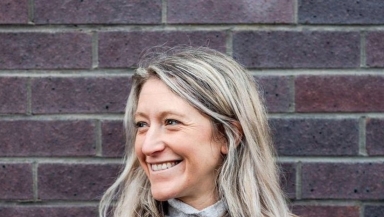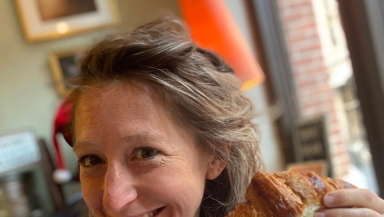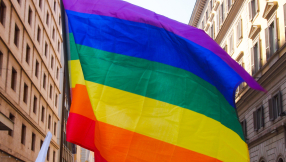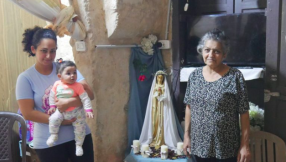
Hope Virgo was just 16 when she developed anorexia, and her turmoil was compounded by the sexual abuse and grooming she had suffered.
In her new book, 'You Are Free (Even If You Don't Feel Like It)', she writes that "anorexia was like this best friend that helped me numb my emotions and gave me a sense of control... it made me feel OK, acceptable, loved".
At the age of 17, she was admitted to a mental health facility and would spend nearly a year there.
A committed Christian, Hope had to wrestle with questions about where God was in the midst of so much hurt. But eventually she came to put her trust fully in Him as the One walking faithfully with her on the path to wholeness.
As she writes candidly in her book, her experience hasn't been so much one of instant healing as getting better day by day and "finding more freedom, love and hope on the journey".
Hope speaks to Christian Today about this journey and how important her relationship with God is to her healing process.
CT: You are a survivor of sexual abuse. What impact did that experience have on your mental health?
Hope: For me, when the sexual abuse ended I was sitting with all these feelings that there was something categorically wrong with who I was and it was this that I needed to change. The shame that I felt became totally consuming and I felt so stuck in this cycle of trying to manage my emotions but having no idea how to.
These feelings I had towards myself and the narrative I had going on in my head had huge impacts on my mental health. And because I didn't know how to process what had happened, because I hated what I was feeling, I had to find another way.
For me the other way of coping with this was to manage my food intake and exercise. And I realised over time the more exercise I did and the less I ate, the better I felt. Not only did it distract me from my day to day, but it numbed all of those emotions I didn't want to feel. And it began to help me feel that maybe I would be good enough one day.
CT: How much do you think your anorexia was related to your experience of sexual abuse? Or do you think other factors played into this, perhaps peer pressure or social media?
Hope: I have spent so much of my life trying to work out what caused me to develop anorexia, and yes for me, the sexual abuse was a huge contributing factor to it but there was a lot more at play, and most likely (and we will know this for sure with more research) but a genetic element too.
For so many nowadays, I believe that we have normalised eating disorder culture, normalised such unhealthy relationships with food and exercise which could contribute to eating disorders. Not only this but the impact of modern society which is often made worse through access to the images, comparisons, judgements and misinformation we often see on social media.

CT: At what point did you realise you needed help?
Hope: When I was 16, my school got in touch with my mum and said they were concerned. We went to the GP and then I was referred to CAMHs. But it took me six months as an outpatient at CAMHs and an admission to a mental health hospital to realise I needed support.
It was the Friday night I was there and I had been in for three days at this point. I was still in denial about having an eating disorder, I still wasn't able to accept I needed support.
On the Friday evening a nurse came in and she got me to draw this life size version of myself on a piece of paper. Once I had finished this, she traced round the outside of me. I then had to stand up and compare the images. The difference between the images was huge. And it was in that moment that I was beginning to see the evidence for the eating disorder.
But over the next year in treatment it took more work, and time to keep moving forward in my recovery. So much of the time with eating disorders, because they are doing something for us we think it's the best thing to do, when actually it is causing huge amounts of harm. But when your brain is starved with anorexia it can be hard to think clearly, so for me, fuelling myself and beginning to talk, whilst it took time, helped me to also realise what I had been doing wasn't healthy.
CT: Was it difficult for you to open up about your mental health struggles and find help with this? Were you able to find help within the Church or from fellow Christians?
Hope: When I was 17, I left church and vowed never to go back. A few people used to come and pray for me when I was in hospital but I had so much anger at God, so much hurt from the church, I couldn't understand why God wouldn't heal me, and why so much hurt had happened. So instead of opening up and giving myself space to feel the pain, I pushed my faith away.
I went back to church in 2019 and did an Alpha Course at HTB. It was hard and challenging in so many places but it also gave me the chance to unpack all my questions and all that hurt. I found people in this environment who took the time to understand what was going on for me and how they could support me, people who opened up and shared their vulnerabilities, which helped me be more honest.
CT: You were admitted to a mental health hospital for anorexia and spent nearly a year there. What was your experience of your Christian faith and of God during that time?
Hope: I pulled further away from God during this time. The anger I felt towards Him about the eating disorder; the abuse and my hospital admission just felt so unfair. I did try at first to open to Him and would cry out to God some evenings but I felt so far from Him. I felt like I had been left on my own to navigate all that was happening.
Instead of giving myself that space to process - perhaps part of it was because of the fear I was feeling about embracing the pain and the changes - I completely withdrew from my faith.
CT: What was it that opened the doorway to healing for you?
Hope: For me, my healing journey is still ongoing and has taken on multiple forms over the last 15 years since my hospital admission, from some amazing therapy I was lucky to access, to unpacking the eating disorder and understanding it more.
I have learnt to communicate my needs more too - learning new ways to speak up, and share what's going on for me.
With recovery from an eating disorder, it is also essential to have the nutritional rehabilitation too. Eating disorders thrive in secrecy so bringing them out into the light is essential for healing.
CT: You've been open about how God's healing didn't happen in a moment but has rather been a journey. Were you ever tempted to doubt God's faithfulness?
Hope: Yes, I did - a lot!
CT: The title of your new book, 'You Are Free (Even if You Don't Feel Like It)', points to that tension we sometimes experience in the life of faith between promise and reality. How were you able to experience freedom in the midst of everything you were going through? Was it something you had to constantly remind yourself of?
Hope: For me, it became a choice. And before exploring this I need to emphasise that eating disorders are not a choice. No one chooses to have an eating disorder but the stigma often arises when people have to get up each day and choose to eat in recovery.
I think so much of life, we live in a tension where we are probably frustrated at points about why certain things play out the way they do and I certainly felt that. And honestly there were moments when I became such a victim around this.
Learning to live this tension feels uncomfortable, but for me it was surrounding myself with the right people - those who would have these heated discussions with me about what I was feeling. It was about journaling this all down. Taking time to allow myself to feel, asking myself what the eating disorder behaviour was still doing in my life, working out whether situations triggered it, blasting worship music.
The reality is that for so many and me included, this tension can be hard, but learning our ways of sitting in it and pressing into God is a good starter, whilst also remaining in a community even when it feels hard.
I also remind myself of affirmations from the Bible and remind myself that God is so for me and can turn things into good. I think for me the biggest challenge is learning to trust and completely surrender without letting the fear totally consume me. And honestly I don't think I am quite there yet!
CT: How do you stay hopeful about experiencing complete healing one day? Does your Christian faith help you to keep going?
Hope: For me, my anger at God has disappeared. Yes I still have frustrations in places, but I no longer blame Him for what happened. It took me a long time to get here but in itself, that was freeing.
My faith is a huge part of my story now. It isn't always easy and honestly I still find it hard in places, and I have a whole lot more learning to do but I am trying to press more and more into God.
I know at times I still need to embrace the pain of healing and know that God still has work to do with me on the process, but I am giving myself space to unpack what this means. And yes, there are frustrations along the way, especially when I see others healed and I don't have all the answers to that, but for me as long as I maintain the honest dialogue with God and keep pressing into that freedom, flooding myself with worship music, staying stuck into a community, and keep talking, it is these things that help me.
Hope is also the author of Stand Tall Little Girl and Hope Through Recovery. Follow her on Twitter @HopeVirgo and Instagram @HopeVirgo_. Sign her campaign to #dumpthescales here.













